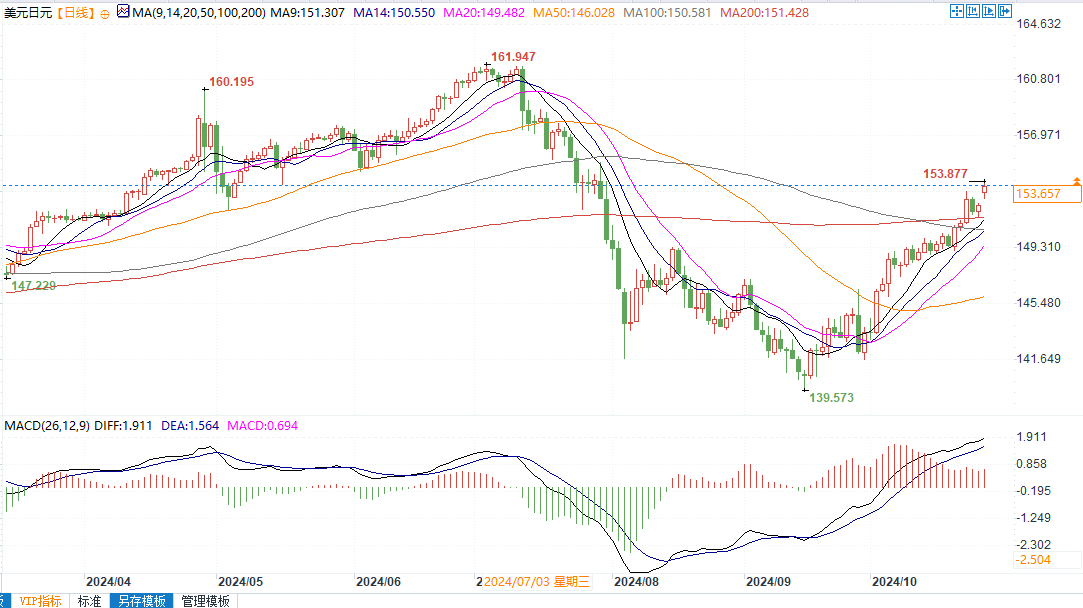The Japanese yen has fallen again, and the Bank of Japan may avoid sending overly dovish messages
At around 11:00 am Beijing time on Thursday, October 31st, the Bank of Japan will hold an interest rate decision. Market analyst Leika Kihara stated that the Bank of Japan will maintain ultra-low interest rates. As concerns about the US economic recession subside, the Bank of Japan may hint that the policy outlook will no longer be as dovish.
Recent data suggests that Japan's potential inflation still faces upward pressure, but the Bank of Japan may continue to adopt a wait-and-see attitude at this week's meeting. The market will closely monitor the quarterly outlook report, as well as the Bank of Japan's risk assessment of the US economy and recent changes in the depreciation of the yen.
According to a market survey on October 24th, most economists predict that the Bank of Japan will keep its benchmark interest rate unchanged at next week's meeting, and a rate hike may occur in December or January next year.
The survey results show that almost all of the 53 analysts expect the Bank of Japan to not adjust interest rates on October 31st. Among them, about half are expected to raise interest rates in December, which is the most optimistic time point. The proportion of analysts expecting a rate hike in January is expected to increase from 19% to 32%, while expectations for a rate hike this month have decreased. Analysts will closely monitor the policy signals of the meeting.
Due to the failure of the ruling coalition in Japan to win a majority in the recent House of Representatives elections, other G-10 and Asian currencies experienced a decline on Monday.
Ryutaro Kono, Chief Japanese Economist at BNP Paribas, said that as the yen falls again, the Bank of Japan may try to avoid sending overly dovish messages.
Frederic Neumann and Jun Takazawa, economists at HSBC, analyzed that in the current context of increasing uncertainty, the Bank of Japan may choose to maintain its current policies unchanged in the upcoming meeting. Although the latest economic data generally meets the expectations of the central bank, there are still many uncertainties in other regions of the world.
They also pointed out that although the recovery of economic activity and prices exceeded expectations, which may provide a basis for the Bank of Japan to take early action, there is currently a lack of clear signs that the central bank will do so. They emphasized that the uncertainty of domestic and international political developments is the reason why the Bank of Japan maintains a wait-and-see attitude. The Bank of Japan has the ability to wait in order to evaluate the upcoming data and confirm progress towards achieving sustainable inflation.
Former Bank of Japan official Takanari Kinouchi mentioned in a report on October 28th that in the face of political uncertainty, Japan may tend to implement more relaxed fiscal and monetary policies.
Konoe Takanari believes that if the ruling coalition needs to seek support from other political parties after losing its majority in the House of Representatives, this may lead to a more expansionary fiscal policy, while monetary easing policies may continue for a longer period of time.
He pointed out that with the increasing influence of opposition parties supporting the continued implementation of loose monetary policy, the Bank of Japan may postpone further interest rate hikes. However, Takanari Kinouchi also mentioned that if the yen exchange rate further declines, the Bank of Japan may consider raising interest rates before the end of the year. This indicates that despite political uncertainty, the Bank of Japan still closely monitors exchange rate fluctuations and their impact on the economy when formulating monetary policy.
Morgan Stanley analysts point out that although the ruling coalition failed to secure a majority of seats in the recent House of Representatives elections, it is expected that Japan's economic policy mechanisms will remain stable, including the Bank of Japan's 2% inflation target.
Morgan Stanley analysts predict that there is a high possibility of the Bank of Japan raising interest rates in January next year, while there are certain risks associated with a rate hike in December. However, if political uncertainty persists or market volatility occurs, the likelihood of the Bank of Japan taking action this year may decrease.

USD/JPY daily chart
Tips:This page came from Internet, which is not standing for FXCUE opinions of this website.
Statement:Contact us if the content violates the law or your rights
